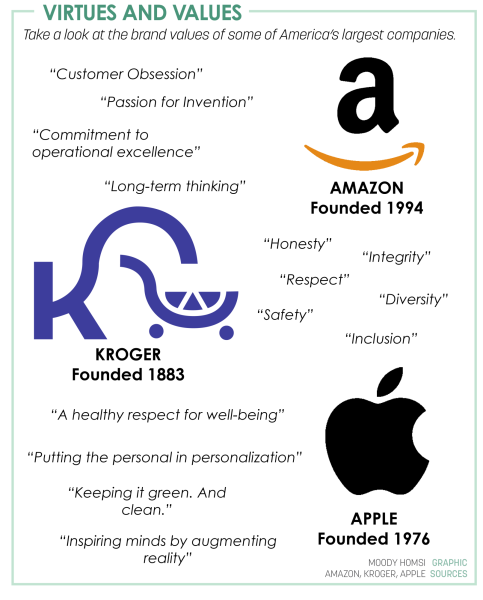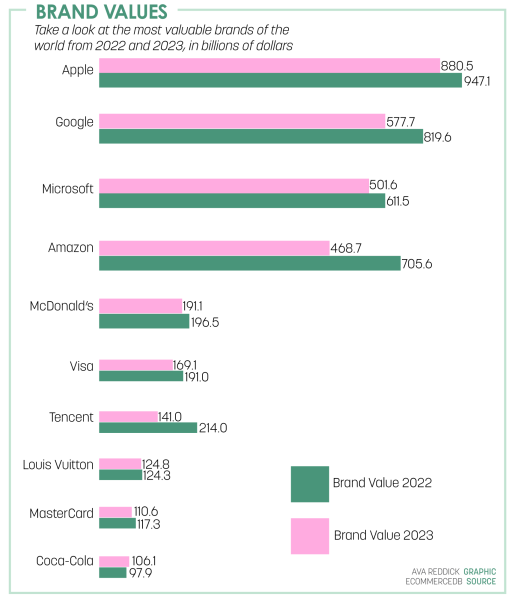
Consumerism has steadily risen for centuries, creating the multifaceted patterns of consumer spending that are seen in the world today. This trend is noted clearly in reports by the Bureau of Labor Statistics, highlighting a 9% increase in consumer spending in the United States in both 2021 and 2022.
As consumer spending as a whole increases, the brands that perpetuate this spending continually develop their brand images. Jessica Ding, vice president of FinXed and junior, said these brand values and images play a role in her spending patterns.
“I would say I do (take into consideration the value of the brand). I think I tend to lean towards brands that have positive ESG (Environmental, Social, and Governance) values and that specifically promote equity and environmental sustainability,” Ding said.
Additionally, Ding said she thinks this behavior is a part of most people’s spending habits today.
“I think that inherently when you see products that have branding, you subconsciously consider brand value,” she said. “No matter whether or not you’re consciously undergoing consumption or unconsciously, I think that brand value is always a part of the decision-making process.”
Similarly, Maxwell Gootee, design director of FinXed and junior, said awareness of brand values plays a key role in helping him make cognizant purchases.
“If I don’t have an opinion on who to buy from for a certain item, I’ll buy from the (brand with values) I know about,” Gootee said. “For example, I’m not super well-versed in what makes a good shoe so I’d just buy from Nike or Adidas because they’re more heavily associated with quality.”
Business teacher Stacie Fowler said she agreed and recalled her own memories in relation to brand values.
“I think it has been important throughout the last part of history,” she said. “I remember my grandpa always buying Chevrolet because he trusted it, but he would never buy a brand name pair of jeans.”
In addition, Ding said this increased awareness and conscious consumption is incredibly vital in making purchases in the current economy.

“Especially now, the market is super oversaturated with tons of different products and a lot of time brands will lie about their values or their like strategies in order to come off in a more positive light,” Ding said. “I think that making the (effort) to intentionally value the way a brand is presenting itself and its operations can help you become a more conscious consumer that aligns to your values and what you want to support in the world, better.”
Gootee said he agreed, and everyone should at least make an effort to be aware of different brands’ values.
“It’s important to be aware of brand values to some degree whether or not you let it impact you because being aware of who you’re supporting is part of being a responsible consumer,” he said.
However, Gootee also said these brands’ values are not the biggest influence on his purchasing patterns.
“I don’t think I’ve really changed my buying habits because of brands’ values very much,” Gootee said. “I still buy what I always have (bought) because it’s hard to tell when a brand genuinely upholds a value, so I prefer to just buy whatever has products I enjoy.”
In contrast, Ding said brand values have definitely pushed her away from certain brands, specifically those involved with fast fashion, but said she also sees how it may still be the only option for others.
“When SHEIN first (became popular), I shopped from it. I’m from a Chinese migrant family so my parents are naturally drawn to websites like that because they’re advantageous for the consumer. But I personally now lean away from fast fashion because I feel a lot of personal guilt engaging in quick consumption so I try not to consume when I can,” she said. “I think that’s just a really nuanced topic, some people can’t access anything other than the price point of fast fashion brands and I don’t want to fault those people when that’s all they have the privilege to access.”
For her part, Fowler said she tends to value her customer experience over brand loyalty.
“Personally, I think I take more into consideration about my experience with the company,” Fowler said. “For example, I love Costco; they have always treated me right and so I feel very comfortable buying anything from there.”
Additionally, Fowler said social media has had an influence on purchasing trends.

“People see influencers showing them their products – and they probably don’t even own, wear or use the products, but they pretend to,” she said. So then people try it. Sometimes it might be great, but in my experience, most of the time I am disappointed.”
Furthermore, both Ding and Gootee said their experiences at this school enhanced their ability to make conscious decisions as consumers.
Ding said her peers as well as the classes she takes made a lasting impact on her purchasing patterns.
“I’m definitely influenced by my environment and I have a lot of friends that are really environmentally conscious and that really made me value sustainability as well,” Ding said. “Also I’m enrolled in IB Business here and I’ve also participated in DECA and other business competitions outside of school. I think that those definitely also altered my perspective to make it more geared to helping me raise more awareness about brand recognition.”
Similarly, Gootee said his role in FinXed helped him become much more aware of brands’ values and being a consumer.
“There’s a big issue with companies called greenwashing where they’ll say that they’re going green but they lie about their impacts and initiatives and part of being a conscious consumer is finding these companies and avoiding them,” Gootee said. “At a bare minimum, a company should be honest about who they are even if it isn’t a perfect image, and Finxed helped me realize that.”
Fowler said she cautions buyers to not buy based on brand only.
“You might be missing out on a whole world of better-made products that choose not to spend money on high-priced marketing,” Fowler said. “I teach personal finance, so I want people to make quality purchases, not just based on brand.”



